
11 Quick Ways to Fix iPhone Won't Charge After iOS 17/18 Update?

"After iOS 17, my iPhone 11 is not charging. Can you help me? After iOS 17 update, the phone can only charge when it is turned off, and after iOS 17.0.3, it does not charge when it is turned off."
- from Apple Community
After upgrading their iPhones to iOS 17/18, many users are eager to update their systems to experience the new features. However, a number of users have found that their iPhones cannot charge properly after the upgrade, which can be quite frustrating. This article will analyze the reasons why the iPhone won't charge after iOS 17/18 update and provide various effective solutions to help you resolve the issue as quickly as possible.
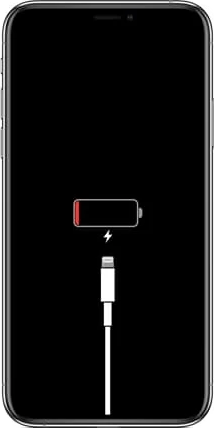
The reasons why an iPhone may fail to charge after an iOS 17/18 update could include the following:
Note: If you notice that your iPhone stops charging at 80%, it's due to the "Optimized Battery Charging" feature introduced in iOS 13. This feature helps protect the battery and prevents the iPhone from overheating while charging, thereby slowing down battery aging.
After identifying the possible causes, here are the specific steps to help you resolve the charging issue on your iPhone after the iOS 17/18 update.
Prioritize using the official Apple charger for charging, and ensure that the charging cable and adapter are not damaged or excessively worn. Non-official or damaged charging equipment may lead to insufficient current, preventing the device from charging.
One common cause of charging problems is a dirty or blocked charging port. Over time, dust, lint, or debris can build up in the port, hindering a proper connection with the charging cable. Use a soft-bristle brush to gently clean out dust and debris from the charging port. Be careful not to damage the metal contacts inside the port during the process.
Sometimes, unstable current from the power outlet or USB port can also affect charging. Try plugging into a different outlet or switching to another USB port on your computer to see if it resolves the charging issue.
A decline in battery health can directly affect your iPhone's charging ability. After upgrading to iOS 17/18, the battery's workload may increase, so it's advisable to regularly check the battery status and replace aging batteries promptly.
Here are the steps:
Step 1. Go to "Settings" > "Battery" > "Battery Health".
Step 2. Check the maximum capacity of the battery, ensuring it's above 80%.
Step 3. If the battery capacity is too low, it's recommended to visit an Apple Authorized Service Provider for a battery replacement.
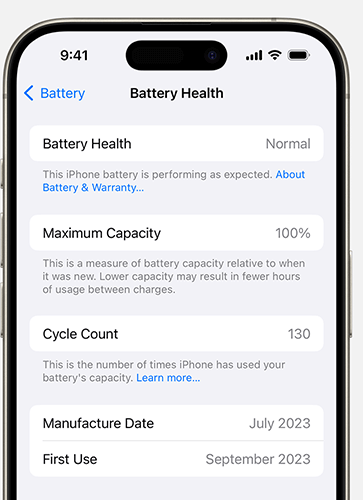
Optimized Battery Charging is a feature introduced by Apple in iOS 13 and later. When activated, your iPhone will pause charging at 80%. To charge your iPhone to 100%, follow these steps to disable this feature:
Step 1. Go to "Settings" > "Battery" > "Battery Health & Charging".
Step 2. Turn off "Optimized Battery Charging" if you want to fully charge your iPhone.
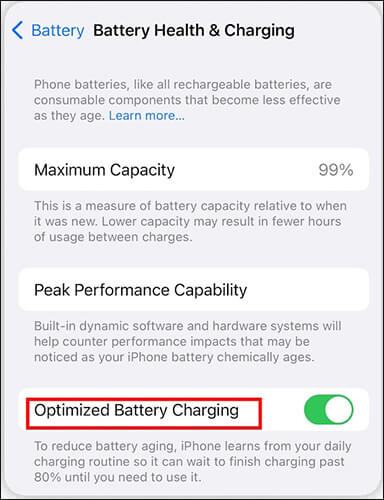
Force restarting your iPhone can clear system caches and resolve certain temporary software issues, potentially restoring charging functionality.
To force restart your iPhone, follow the steps below:
iPhone 8 and later:
iPhone 7 / 7 Plus:
iPhone 6s and earlier:
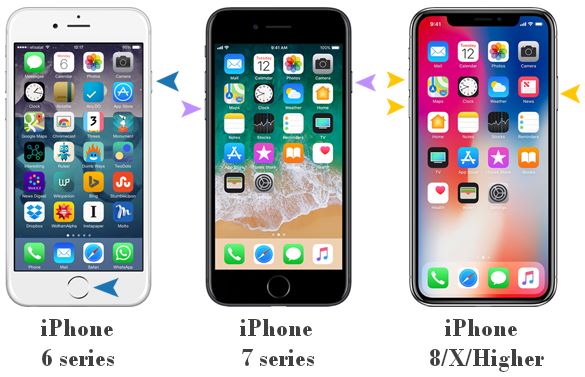
iOS 18 updates may introduce new system settings that can cause certain functions to behave abnormally. Resetting your iPhone settings can restore the default configuration and resolve charging issues.
Here is how to do it:
Step 1. Go to "Settings" > "General" > "Transfer or Reset iPhone" > "Reset" > "Reset All Settings".
Step 2. Enter your password and confirm the reset.
Step 3. After the reset is complete, reconnect the iPhone to the charger for testing.
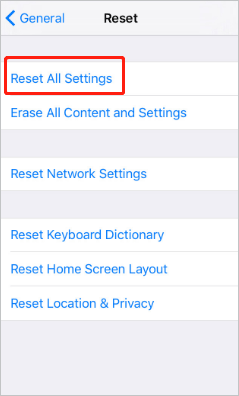
If you are interested in the difference between Reset All Settings and Erase All Content and Settings, you can check this guide.
Reset All Settings vs Erase All Content [Informative Comparison]After an iOS upgrade, Apple usually releases minor updates to fix bugs. If your iPhone is not charging, it might be due to a system bug, so it's recommended to check for updates to the latest version.
To update your iPhone, follow the steps below:
Step 1. Go to "Settings" > "General" > "Software Update". (iPhone software update failed?)
Step 2. Check for any new system updates and follow the prompts to install.
Step 3. After the update is complete, reconnect the charger to see if it works.
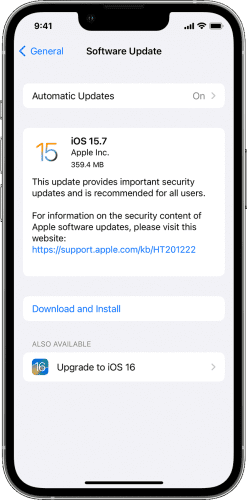
If the above methods are ineffective, you can use iTunes to restore your iPhone to factory settings. This will erase all data, so be sure to back up your iPhone before proceeding.
Here's how it works:
Step 1. Connect your iPhone to your computer and open iTunes.
Step 2. Click the device icon and select "Restore iPhone".
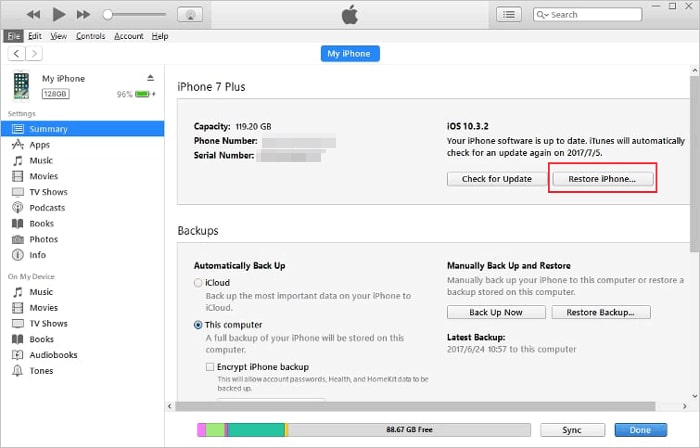
Step 3. Follow the on-screen prompts to complete the restore process.
Step 4. After the restore, reconfigure your iPhone and check if charging is back to normal.
If you want to avoid data loss, iOS System Recovery is a must-mention tool. It is a professional iOS system repair software that supports fixing various system issues and offers two repair modes, allowing users to restore iPhone functionality without losing data. For instance, it effectively resolves problems like the iPhone won't charge after the iOS 17/18 update, making it a reliable choice for addressing iOS system issues.
Highlights of iOS System Recovery:
Here is how to use iOS System Recovery to fix the iPhone won't charge after iOS 17/18 update:
01Download and install the software on your computer, then open it and select "iOS System Recovery" from the main menu. Connect your iPhone or iPad to the computer with a USB cable, and tap "Trust" on your device.
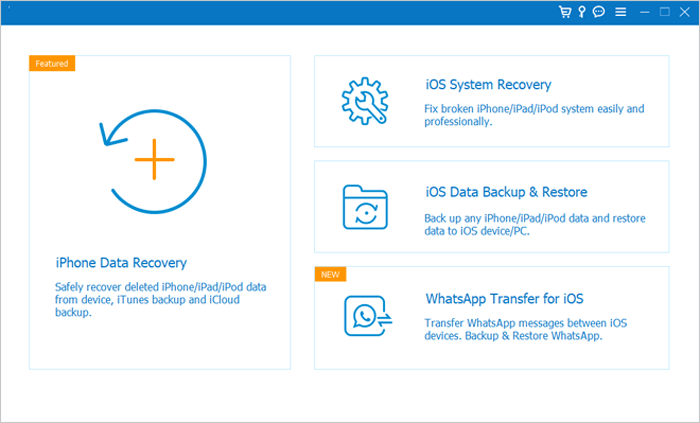
02A pop-up will display a list of issues the software can address. Click "Start" to continue.
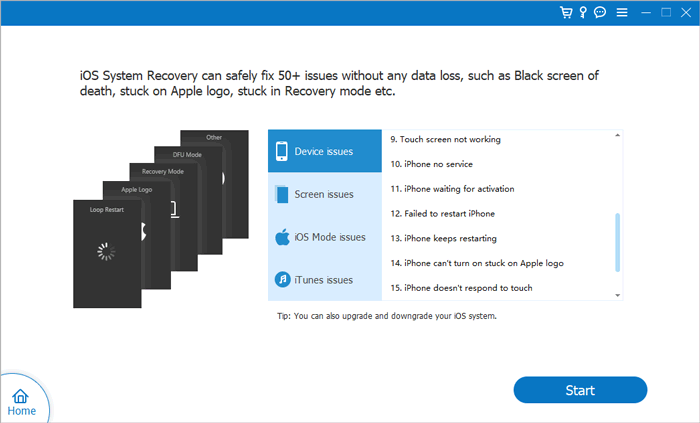
03Choose either "Standard Mode" or "Advanced Mode" based on your needs. The tool will detect basic information about your device; click "Confirm" to proceed.
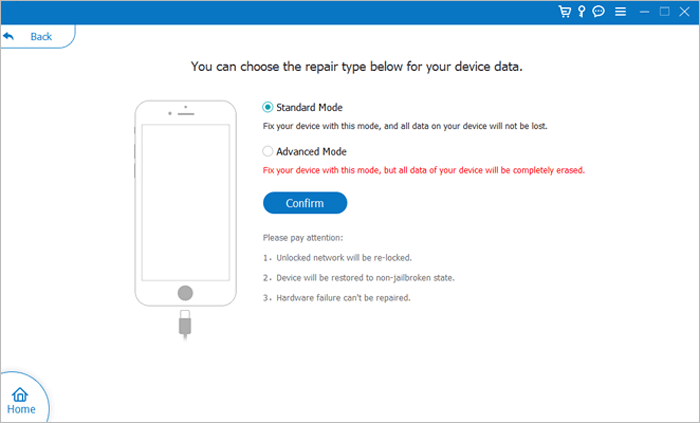
04Finally, click "Repair" to start downloading the firmware package and repairing your iOS device.
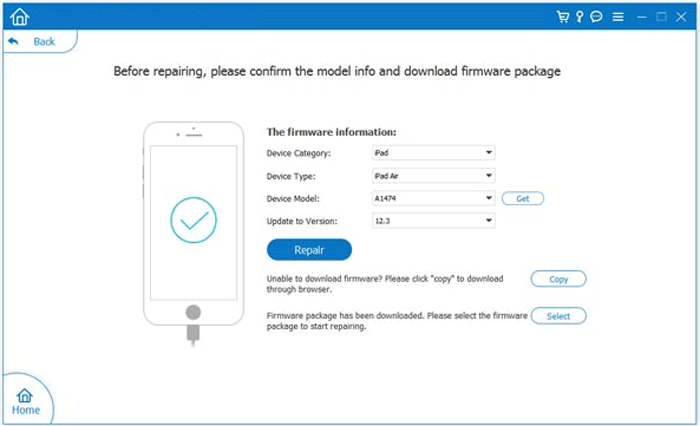
If the issue persists, it may be a hardware failure or another complex problem. It's recommended to contact Apple Support or visit an Apple Authorized Service Center for professional diagnosis and repair services.
When an iPhone won't charge after the iOS 17/18 update, you can try solutions such as checking the charging accessories, cleaning the charging port, and inspecting the battery health. If the issue persists, it's recommended to use iOS System Recovery to fix system issues. This is a simple and effective solution that won't cause data loss.
Hopefully, the solutions in this article will help you quickly resolve the issue and restore your iPhone's normal charging functionality.
Related Articles:
[2024 Newest] How to Fix iOS 18 Battery Drain Issue in 10 Ways?
[100% Success] How to Fix iOS 18 Overheating Problem in 2024?
[Solved] How to Fix iPhone Won't Turn on After iOS 18 Update?
[100% Works] How to Fix Unable to Check for iOS 18 Update on iPhone?